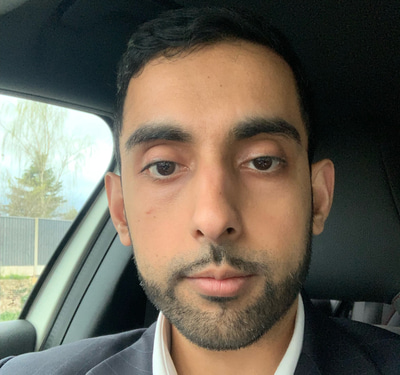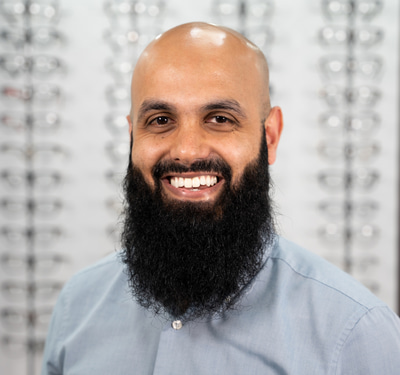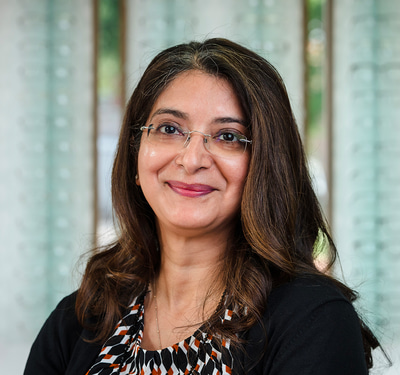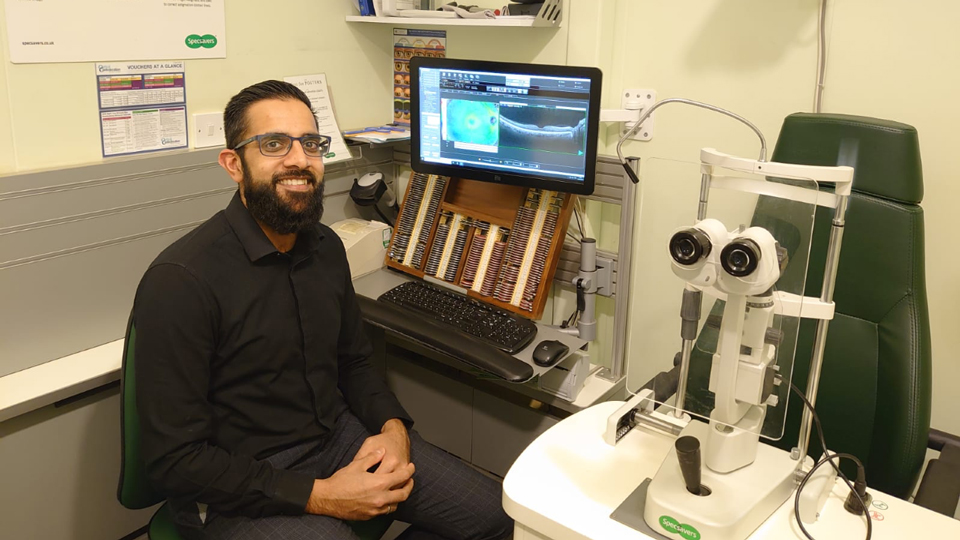- OT
- Life in practice
- Practitioner stories
- “The joy that Ramadan brings is truly something different”
Ramadan
“The joy that Ramadan brings is truly something different”
OT shares the experiences of optometrists observing Ramadan – and offers tips on how other optical workers can support their colleagues

07 April 2022
According to GOC statistics, Islam is the third most common belief system among UK optometrists (behind Christianity and no religion), with close to one in five eye care professionals identifying as Muslim.
OT approached different optometrists to find out what Ramadan means to them and how to support inclusive workplaces during this time.

Name: Qadir Baz
Role: Optometrist based in Birmingham
What Ramadan means to me:
Ramadan is a time of reflection and contemplation, and for spending more time together with our loved ones. The month reminds me to show gratitude for all the things that would otherwise be missed in this fast-paced age we are living in.My first memory of Ramadan:
Waking up in the early hours of the morning helping my parents to prepare the pre-dawn meal.How Ramadan affects my working day:
I feel fasting gives me focus and allows me to concentrate harder than if I wasn’t fasting. Often in normal months my mind usually starts to wander to what I will be having for lunch from 10am onwards… After lunch, I tend to feel lethargic, which makes returning to work more difficult. If I know I’m fasting my mind and body does not go through the above cycle. I’m able to stay focussed and I often find I work much harder. Ramadan reminds me we don’t need to eat as often as we do in the normal months, especially with our sedentary lifestyles.How colleagues support me during the month:
By the numbers
17% of UK optometrists and dispensing opticians are Muslim
How I break my fast at the end of the day:
With dates, water and plenty of fruit.My tips for optometrists observing Ramadan:
Have an open dialogue with your managers well in advance to help give time for adjustments to be made.
Name: Idris Umarji
Role: optometrist and partner at Netherton Eye Centre & Makerfield Eye Centre, Hakim Group practices
What Ramadan means to me:
Ramadan for me is a chance to reset spiritually; a perfect opportunity to hit pause on daily life, reflect, pray and spend more time with the family.My first memory of Ramadan:
The joy that Ramadan brings is truly something different. My first memories of Ramadan as a child are endless evenings spent eating good food, then a trip to the shops to buy the treats I’d been thinking about all day (it is amazing how much 50p could get you back then!)How Ramadan affects my working day:
In Ramadan, we wake up much earlier to fuel up and commence fasting. We also pray later into the evening, meaning our days tend to be a lot longer. When I do start work, the need to stay more alert for each patient is a conscious effort, especially without the usual caffeine hit. The key for me is to pace myself all month and not burn out within the first few weeks. I rest up wherever possible.How colleagues support me during the month:
I have experienced 14 Ramadans as an optometrist and thankfully wherever I have worked, the teams have always been very supportive. They allow later starts or early finishes by working through lunches. They always accommodate prayer times all year long, which is appreciated.How I break my fast at the end of the day:
Following dates and water at the mosque, I usually come home to eat awesome food. It is daily practice to over indulge, and promise myself to eat less tomorrow. Jokes aside, please try warm, juicy dates after a few hours of not eating: it’s an experience in itself.My tips for optometrists observing Ramadan:
The key really is to pace yourself. Balance work with family life and feeding the soul through prayer, fasting and charity. Rest and sleep where you can. But the main thing for all Muslims observing this month is to cherish it, much like any other ‘festival’…it’s gone before you know it.
Name: Aisha Jeewa
Role: optometrist and chair of Walsall Local Optical Committee
What Ramadan means to me:
Ramadan is the holiest month of the year in Islamic culture – knowing that everyone around the world will be engaging in this extraordinary act of worship and will be fasting during daylight hours at the same time. There is a kind of buzz of excitement in the air as Ramadan approaches.
Fasting for me is very much about steadfast self-discipline and repentance. It’s an opportunity to reset our inner selves, to work on spirituality, reflect, to be charitable and spend time with family and friends. It’s also a time to think about those less fortunate than myself.
We take our food, drink, and sleep for granted: we don’t realise that this daily routine in our lives keeps us the nice, calm, and peaceful human beings that we usually are. Without our shield of a good night sleep or a full belly, fasting tests us. How do we deal with our daily life? How do we behave in a difficult situation? Ramadan is about feeding our soul with goodness and not our “belly” and being humble and mindful of all of humanity.
My first memory of Ramadan:
As a young child I’d wake up to the smell of my mum’s delicious breakfast in the early hours of the morning, just before sunrise. It was a peaceful and surreal moment; knowing that everyone else in the neighbourhood was asleep and the streets outside were so quiet.
While the proverb ‘an apple a day keeps the doctor away’ is known in much of the world, the Muslim equivalent is ‘seven dates a day keeps the doctor away’
I loved how our family gathered for a pre-dawn meal and took part in the morning prayers. We would break the fast together with my younger siblings, with my father at the head of the table, offering prayers and thanking God for all has been provided to us. We would end each night as a family with prayers and having that spiritual togetherness with my sister and brother felt very special to me.
How Ramadan affects my working day:
The month does test my endurance. I take each day just as another day, but I find myself more focused and more conscious of God. I become increasingly attentive to my patients. My energy and my thoughts are more streamlined. I find being busy at work, my body and mind is active, which makes fasting easier and the days go very quickly.
At the end of work, I then head home to prepare the evening feast for the breaking of the fast and try to rest until sunset. During my lunch break, I will use the time to rest, perform a prayer and read short chapters from the Quran.
How colleagues support me during the month:
By the numbers
4.4% of the UK population is Muslim
How I break my fast at the end of the day:
I like to think during Ramadan we feed our soul with goodness and I also like to feed my body healthy food. I personally like to break my fast with a glass of lemon/mint water and fresh dates. It is then followed by a variety of fruits.
Dates are great way to break the fast; they provide natural sugars for energy. Being well hydrated is most important and can be a cause of fatigue. It is very important to replace fluids lost during the day and to start the next day of fasting well-hydrated. Then, there are some family favourites – traditional food, such as a variety of fritters, stews, soups, flat breads, and grilled meats. They’re eaten also at the time of breaking fast in Ramadan.
Dates and Ramadan
Dates are a food with special significance during Ramadan.
The dried fruit is mentioned more than 20 times in the Quran, with the Prophet Muhammad recommending that Muslims break their fast with dates, or, if not available, a few sips of water.
Dates also have nutritional qualities that make them suited to breaking a period of fasting – they are easily digested, helping the blood glucose levels return to normal.
They are high in fibre and contain potassium, magnesium and iron.
Optometrist, Aisha Jeewa, explains: “Dates have been for centuries a Ramadan tradition. Following the Prophet’s tradition is one way of connecting with and remembering him, which is a spiritual experience for Muslims.”
“While the proverb ‘an apple a day keeps the doctor away’ is known in much of the world, the Muslim equivalent is ‘seven dates a day keeps the doctor away.’ The Prophet argued that seven dates in the morning protected one from poison and witchcraft. This gives the date a sort of mystical property, almost supernatural,” she continued.
“Dates have long been a symbol of prosperity in the Arab world. Even today, it’s customary to greet visitors in the Middle East with a serving of fresh dates as a warm welcome,” Jeewa added.
My tips for optometrists observing Ramadan:
Colleagues who are fasting should try to have some weeks off during this month or if possible, shorten your working hours. Have time to rest at the end of the day. Despite not eating lunch or dinner, I have always tried to take my break and I would encourage all optometrists observing Ramadan to do this too – breaks are critical. They not only offer me the necessary time to rest from work but time to meet with other colleagues. If your work involves travelling long distances, make sure you have a water bottle and some snacks to open your fast with.
My tips for colleagues to support those observing Ramadan:
Different people will celebrate Ramadan in various ways. Supporting Muslims at work during this time is not just thinking about what to say to someone fasting for Ramadan, it’s about showing an understanding and considering how you can support individuals.
Taking time to check in with fasting colleagues and offer support or adjustments is helpful. Whilst some Muslims will prefer not to talk about it or adjust their working practices at all, others will feel very appreciative when colleagues take an interest and get involved in act of kindness and being charitable.
Fasting can have an impact on energy levels, coupled with longer nights spent in acts of worship. For many Muslims the first few days of fasting are the most challenging, whilst the body acclimatises to caffeine withdrawal.
Fasting colleagues can be supported with more frequent rest breaks and more inclusive meeting hours. This could include earlier starts and earlier finishes, or forgoing lunch breaks for an earlier finish. Whilst flexible working and time off are wonderful inclusive options, this should be a choice for employees and shouldn’t be applied as an expectation. Many Muslims wish to pray more often during Ramadan, typically for a few minutes two or three times a day. Having a quiet and private space to pray is often very much appreciated. Consider if you have such a space to offer.
Ramadan is the most sacred month and employees observing the month may excuse themselves from attending social activities or events which are scheduled for the evening. Employers should be understanding and ensure that this does not result in these employees suffering a disadvantage in the workplace and missing out on opportunities that equate to levels of exclusion.
As a young child I’d wake up to the smell of my mum’s delicious breakfast in the early hours of the morning, just before sunrise. It was a peaceful and surreal moment; knowing that everyone else in the neighbourhood was asleep and the streets outside were so quiet
Employers and managers should be prepared for annual leave requests for Eid celebrations. They must recognise that the Islamic calendar is lunar so Muslims won’t know the exact date upon which Eid will fall. This means some people may request for time off at relatively short notice. Therefore, be flexible with working arrangements, where organisational needs and service delivery permits. Employees could provisionally book a range of two to three days off and then work the days outside of where Eid lands.
Eid is the festival that marks the end of Ramadan, and this year is thought to take place between the evening of Monday 2 May and the evening of Tuesday 3 May. I wish all my colleagues Ramadan Mubarak/kareem. Please take care of each other and make sure you are getting time to rest. This past year more than ever has shown us the value of supporting staff wellbeing.
On the question of whether it is OK to eat in front of colleagues who are fasting, I don't mind if you are eating in front of me, even if I am sitting right beside you. Just don't offer food if you know your colleague is fasting. Fasting month isn’t about starving. It’s about giving up excess and giving back to others in a similar way to Catholic Lent. I prefer to see others go about their daily lives while we live ours.
Employer support: optometrist Kamran Hussain shares his experience of working at Specsavers during Ramadan

For myself, and no doubt many others of the Islamic community, Ramadan is by far our most favourite month of the year.
And it is, for this reason, that I take great pride in knowing that I have the support in place at work to enable me to enjoy such an occasion.
Time off for the holy month of fasting is included within our Special Leave Policy. This states that my managers will do whatever they reasonably can to grant any requests for time off from my annual holiday entitlement.
The HR team have taken the time and effort to support my directors with practical tips on how to promote inclusivity. This includes supporting team members partaking in Ramadan by scheduling more complex tasks in the morning rather than later in the day, trying to avoid team lunches or events which involve food during this month, appreciating that we may need additional breaks when we are fasting and booking optometry cover as needed during this period.
My colleagues are also respectful, and I greatly enjoy answering any questions they may have as I feel open discussions promote understanding.
I am given a private space to pray and I feel comfortable discussing with my directors if I need any changes to my day. Our working environment is such that we all take the time and effort to support each other where we can.
I'm conscious that some of my patients are celebrating Ramadan too. We take great care in ensuring everyone in the practice understands how to support them. If, for example, patients are using eye drops to treat glaucoma, we remind them how important it is to keep taking their drops during Ramadan. We explain that stopping treatment could lead to permanent sight damage.
We share messages from the Muslim Council of Great Britain which states that using eye drops does not break one's fast as they are not considered to be food or drink. If patients are worried that drops reach the back of their throat, I tell them to try pressing on the inside corner of their eye after applying drops or to use drops outside fasting hours.
The AOP has produced guidance for employers and employees to provide an inclusive workplace during Ramadan. The guidance is available for members online.
Recognising Ramadan at 100% Optical
This year 100% Optical (23 – 25 April, London ExCeL) falls during Ramadan.
A prayer room is available onsite for attendees, located beside Hall S9.
Exhibitors are being asked to be considerate of those observing Ramadan, with many making plans to ensure accessibility for show visitors who will be fasting.


Comments (1)
You must be logged in to join the discussion. Log in
Farahrizvi 08 April 2022
Beautiful article!
Ramadan is actually an amazing experience of increased spirituality, and focus throughout the day. Also, you actually feel more energised than on normal days. Furthermore, the health benefits of body detoxification are astounding. I would recommend fasting to one and all.
Report Like 291